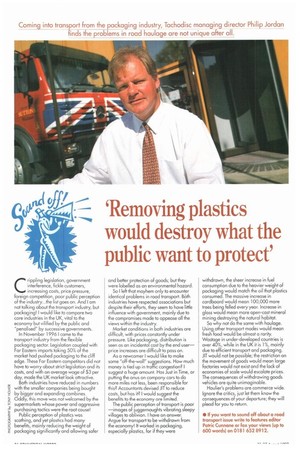'Removing plastics would destroy what the public want to protect'
Page 38

If you've noticed an error in this article please click here to report it so we can fix it.
Crippling legislation, government interference, fickle customers, increasing costs, price pressure, foreign competition, poor public perception of the industry., the list goes on. And I am not talking about the transport industry, but packaging! I would like to compare two core industries in the UK, vital to the economy but vilified by the public and "penalised" by successive governments.
In November 1996 I came to the transport industry from the flexible packaging sector. Legislation coupled with Far Eastern imports taking 50% of the market had pushed packaging to the cliff edge. These Far Eastern competitors did not have to worry about strict legislation and its costs, and with an average wage of $3 per day, made the UK market look attractive. Both industries have reduced in numbers with the smaller companies being bought by bigger and expanding combines. Oddly, this move was not welcomed by the supermarkets whose power and aggressive purchasing tactics were the root cause! Public perception of plastics was scathing, and yet plastics had many benefits, mainly reducing the weight of packaging significantly and allowing safer and better protection of goods; but they were labelled as an environmental hazard.
So I left that mayhem only to encounter identical problems in road transport. Both industries have respected associations but despite their efforts, they seem to have little influence with government, mainly due to the compromises made to appease all the views within the industry. Market conditions in b4:411 industries are difficult, with prices constantly under pressure. Like packaging, distribution is seen as an incidental cost by the end user— price increases are difficult to pass on. As a newcomer I would like to make some "off-the-wall" suggestions. How much money is tied up in traffic congestion? I suggest a huge amount. Has Just in Time, or putting the onus on company cars to do more miles not less, been responsible for this? Accountants devised _HT to reduce costs, but has it? I would suggest the benefits to the economy are limited. The public perception of transport is poor —images of juggernaughts vibrating sleepy villages to oblivion. I have an answer. Argue for transport to be withdrawn from the economy! It worked in packaging, especially plastics, for if they were withdrawn, the sheer increase in fuel consumption due to the heavier weight of packaging would match the oil that plastics consumed. The massive increase in cardboard would mean 100,000 more trees being felled every year. Increase in glass would mean more open-cast mineral mining destroying the natural habitat. So why not do the same with haulage. Using other transport modes would mean fresh food would be almost a rarity. Wastage in under-developed countries is over 40%, while in the UK it is 1%, mainly due to efficient transport and packaging. JIT would not be possible; the restriction on the movement of goods would mean large Factories would not exist and the lack of economies of scale would escalate prices. The consequences of withdrawing goods vehicles are quite unimaginable. Haulier's problems are commerce wide. Ignore the critics, just let them know the consequences of your departure; they will plead for you to return.
• If you want to sound off about a road transport issue write to features editor Patric Cunnane or fax your views (up to 600 words} on 0181 652 8912.
































































































